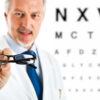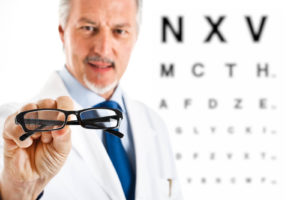
The Difference Between Farsightedness and Nearsightedness

If you’re new to the world of vision troubles and have just been diagnosed as being either farsighted or nearsighted, you’ve probably got some questions about what your diagnosis means. First of all, what’s the difference between the two conditions?
It can be difficult to know what questions to ask your eye doctor when you receive a diagnosis like this. Hopefully, the information in this blog will give you a place to start in your search for answers.
The terms farsightedness and nearsightedness, or hyperopia and myopia, are confusing in and of themselves.
Does being farsighted mean you’re really good at seeing things far away? Does being nearsighted mean you’re an excellent reader? Or is the opposite true?
Not exactly. It’s not quite as simple as either of those options.
Today we’ll discuss what, exactly, these conditions are in addition to explaining the difference between farsightedness and nearsightedness.
What Is Farsightedness?
Though you may think that having farsightedness means that you can see far away, it actually means that it’s difficult to see things that are close. Folks suffering from farsightedness can see distant objects well but focusing on a book or map is difficult. Up-close objects appear blurry. So yes, your distance vision is technically better than your close-up vision, but that doesn’t mean it’s anything extraordinary.
So what happens in the eye when you are farsighted? Simply put, the light being directed into your eye falls behind the retina instead of on it.
It’s also important that you recognize the medical term for farsightedness: hyperopia. It’s a very common type of refractive error, so if you receive this diagnosis, know you’re not alone.
Farsightedness is caused by a problem in the eye such as a lens that just isn’t round enough or an eyeball that is too short. As farsightedness is usually the symptom of an imperfect eye, the root cause is typically due to genetics. Because of these imperfections, sinus infections, injuries, and migraines can all be effects of hyperopia.
You can usually treat farsightedness with corrective lenses. Of course, you’ll need to go to a reputable eye doctor to be fitted for prescription lenses. Keep close tabs on the condition, as it is a risk factor for both glaucoma and crossed eyes. Regular eye doctor visits are essential to keeping your eyes healthy.
However, did you know farsightedness can be improved naturally with eye vitamins, like those found in our Ocu-Plus Formula? Containing 17 of the most essential vitamins, minerals, and herbs for vision health, the daily supplement will strengthen your vision and help to prevent more severe vision problems in the future.
It’s also important to note that if you are already having vision problems, there is an even greater chance that you will develop more serious vision problems as you age. Luckily, there are also specific eye vitamins to treat farsightedness.
What Is Nearsightedness?
Just as farsightedness doesn’t mean that you have a special gift for seeing things at a distance, nearsightedness does not mean that you’re able to see things that are near really well.
Nearsightedness, or myopia, actually means that seeing things at a distance is difficult for you. You may be able to read books with no problem but street signs that are far away appear blurry to you. Many people all over the world suffer from myopia – about 32 percent.
If you have nearsightedness, the light entering your eye does not fall directly on its retina but in front of it. The symptoms occur due to a number of factors from genetic malformations to pharmaceuticals, aging, and cataracts.
You can usually treat nearsightedness with corrective lenses and sometimes LASIK surgery. But just like farsightedness, nearsightedness can be improved naturally with eye vitamins.
No matter what your age is at the moment, these eye vitamins can help you to improve your vision. Corrective lenses only correct the symptoms while you are wearing them. Vitamins can improve the way your eyes work so that you can correct the problem, not just the symptoms.
How Do Farsightedness and Nearsightedness Differ?
Clearly, there are a lot of similarities between farsightedness and nearsightedness. They are both usually treated with corrective lenses, after all. Farsightedness and nearsightedness are both conditions that affect our eyes’ ability to see objects clearly. However, with farsightedness, the light falls behind the retina, and with nearsightedness, the light falls in front of the retina.
Farsightedness makes it difficult to see objects that are close-up. Nearsightedness makes it difficult to see objects from a distance. Farsightedness occurs due to an imperfection in the eye and is usually genetic. Nearsightedness occurs because of any number of factors and has many different degrees of severity. It’s also theorized that all of that screen time that starts at such a young age is contributing to higher rates of nearsightedness amongst the global population.
How Are Farsightedness and Nearsightedness the Same?
Luckily, these two diagnoses share important similarities. Both hyperopia and myopia have the ability to improve with eye vitamins that strengthen the muscles and help your eyes to focus properly over time. In the past, doctors would simply prescribe people with nearsightedness or farsightedness corrective lenses.
The problem with corrective lenses is that the name is deceiving. The lenses do not actually correct the problem with your vision. When you take the glasses off or the contacts out, the problem still remains.
Research into methods that will actually correct the vision problems in the eye itself is a more recent development. Researchers have conducted many studies on the effectiveness of a healthy diet in correcting or strengthening the eyes to function correctly. Not surprisingly, it is proven over and over again that people will see significant improvements in their vision just by eating well and exercising.
Many of our customers have reported good results with the vitamins that we provide. We do have to warn you that the Ocu-Plus Formula is not an overnight cure for vision problems. As with any other eye vitamin supplement, it takes time to see noticeable improvements. But, once you start seeing the improvements, they’ll make a world of difference.
Our Rebuild Your Vision Ocu-Plus Formula Contains All 17 Vitamins, Minerals, and Herbal Supplements to Improve Your Eye Health!












What if I’m both farsighted and nearsighted? My clear vision is at about 5 feet. Close up is blurry and far away is blurry.
This article is so informative! Thank u!
Always took pride in my 20/20 until today, I hit 40 in a month and found out I’m now 20/25 near sighted myopia
it is very usefull to us . thanks
I see far with one eye .. and near with the other … is this weird how do i fix this
What do they consider it, when you don’t see small things clearly regardless of the distance? Close or far, if something is small, I cannot see it clearly. Obviously it seems to be farsightedness, because books, maps, magazines newspapers are small print. I can’t read road signs that are small either (ie street corner signs with street names).
Going by the backwardness of eyesightedness, I’d call myself largesighted or having largesightedness.
Very informative!
I’m doing same thing right now , it’s like a little bit of double vision